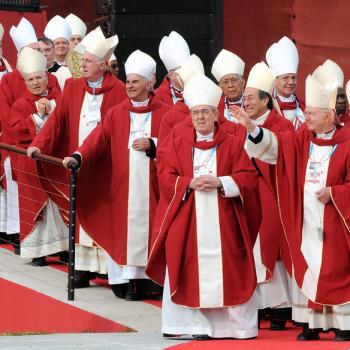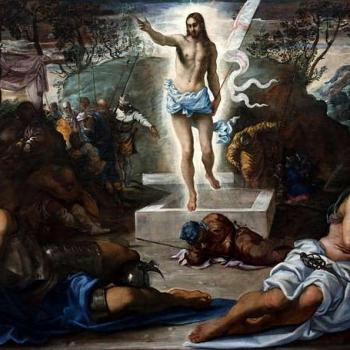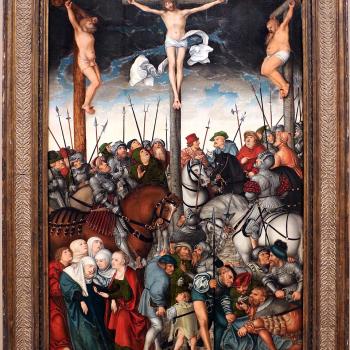Here is another excellent review of Flannery O’Connor’s Prayer Journal, in Slate, of all places. It’s by Marian Ryan, who begins by saying how she does not believe in God. In addition to her thorough account of the book, with fascinating and judiciously chosen quotations, her review lets us see how O’Connor and her faith are getting inside the head of an unbeliever.
Some Christians say that O’Connor is too dark, too negative. How do you account for her work being such an effective literary apologetic to non-believers?
From Marian Ryan Flannery O’Connor and Catholicism: A Prayer Journal, reviewed, in Slate:
When I was diagnosed with a rare muscle disease a dozen years ago, it hit me that I didn’t believe in God. Maybe “hit me” is too strong a way to put it. I just gradually realized that I wasn’t praying to God to help me stay well, to understand or accept the news, not “offering it up” or asking, Why me? There was nothing there, merely a nonexistent connection, although I’d been raised by faithful parents and educated for 16 years in Catholic schools. But then my father died, several years later, and I wanted to know that he still somehow continued. He simply could not have been extinguished—that was unthinkable. For a while I went to Masses said in his name, and just recently I brought home his old set of rosary beads, on which the crucifix is missing—his final set was buried with him. Could he be praying still? I wonder. I envy his devotion.
In much the same way, I’m jealous of Flannery O’Connor, though she’s been dead nearly 50 years. I envy her not only because she was brilliant, the maker of astoundingly original and subversive works of art, but because she believed in God. She believed in the Father, the Son, and the Holy Ghost. She believed in the Redemption, and Life Everlasting. She believed, with an unerring rigor, in the supernatural, and that God’s grace could open up upon us at our most dire moments and, if we accepted its gift, make us—fleetingly at least—better beings. . . .
O’Connor believed in Catholic doctrine with a confidence and surety that sustained her through battles with lupus, her own debilitating and finally fatal disease, as well as her daily routines: from early morning Mass to the writing desk and through her interchanges with extended family and the clans of peafowl strutting through the yard of her family estate. She was anchored in a way that the nonbeliever can never be. In many of her essays about being a Catholic writer, she wrote that her faith, rather than imposing limits, left her free to observe the ways of the world around her. Did this help her achieve such heights of originality and confidence? In her powerful stories and novels—nearly every one a tour de force—her judgment, though coupled always with wit, is formidable, rolling over us like the tractor that bears down on the Displaced Person’s backbone while Mrs. McIntyre locks eyes with the help.
She used the journal (reproduced at the back of the book in facsimile form) to chart her own struggles with understanding. In its pages the fledgling writer addresses herself to God in an intertwined quest to do these things well: pray, write, love—with love reserved for the Lord. (As for eating, she worries she’s a glutton and berates herself for eating too many Scotch oatmeal cookies.) She wrestles often with her distinctly un-Catholic self-regard. “I cannot love Thee the way I want to,” she writes. “You are the slim crescent of a moon that I see, and my self is the earth’s shadow that keeps me from seeing all the moon … what I am afraid of, dear God, is that my self shadow will grow so large that it blocks the whole moon.”
Her ambition is plain but something she tries to accommodate to God’s will. “Please help me dear God to be a good writer and to get something else accepted,” she implores, but then adding, aware of the sin of pride, “That is so far from what I deserve, of course, that I am naturally struck with the nerve of it.” She questions her motives, her honesty, and worries over her presumption: “I have not asked You, I feel, in the right way. Let me henceforth ask you with resignation . . . Oh God please make my mind clear. Please make it clean.”
She longed for a spiritual but visceral closeness with God, “a warmth of love heating me.” In the journal she demurs at the idea of its being “a metaphysical exercise,” and later, in her essays, she would emphasize the importance of the concrete, that “fiction begins where human knowledge begins – with the senses.” The Catholic faith, with its emphasis on the resurrection of the body, and on the actual presence of the body and blood of Christ in the sacrament of Communion, embraces abstraction far less than other denominations.
O’Connor was the foremost interpreter of herself as a Catholic writer, concerned, she famously wrote in a later essay, with “the action of grace in territory held largely by the devil.” In the journal, she asks frequently for grace—in fact, she struggles with the notion of asking for it, with having to reconcile her ambition with the religious virtues of patience and passivity. “My dear God,” she writes, “how stupid we people are until You give us something … I would like to write a beautiful prayer but I have nothing to do it from … I cannot do it. Yet at some insipid moment when I may possibly be thinking of floor wax or pigeon eggs, the opening of a beautiful prayer may come up from my subconscious and lead me to write something exalted.”
The journal entries are more plaintive and self-deprecating than exalted, and the Prayer Journal is at least as much about her path as an artist as it is about her faith. She worries her mind is not strong, she describes it as being “in a little box, dear God, down inside other boxes inside other boxes and on and on. There is very little air in my box.” She worries that she may be, artistically, merely mediocre. “If I ever do get to be a fine writer,” she says, “it will not be because I am a fine writer but because God has given me credit for a few of the things he kindly wrote for me.” But “right at present this does not seem to be His policy. I can’t write a thing.”
HT: Caleb Sasser












